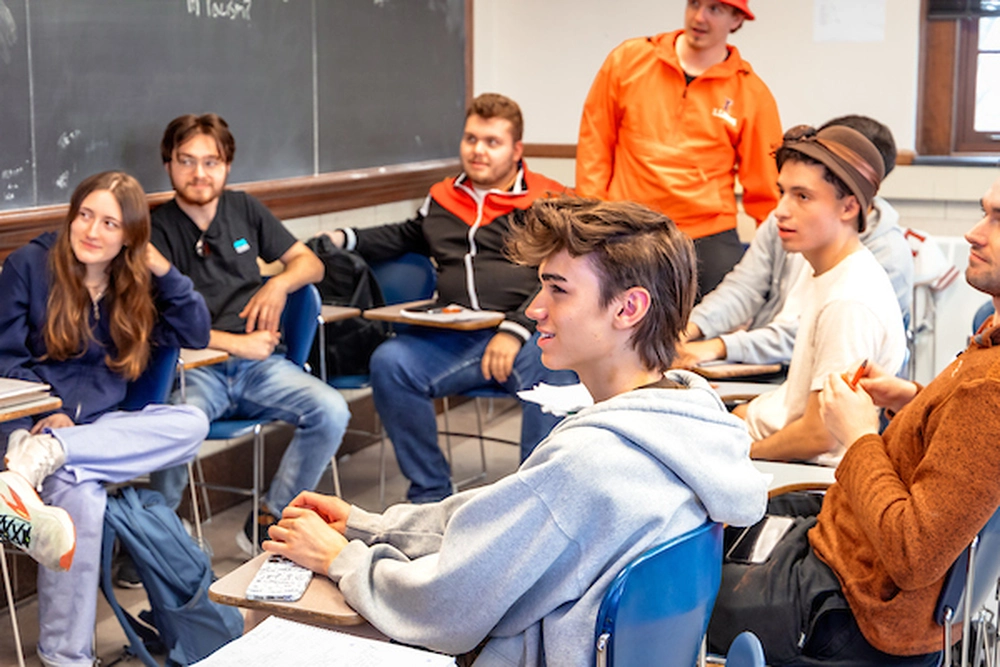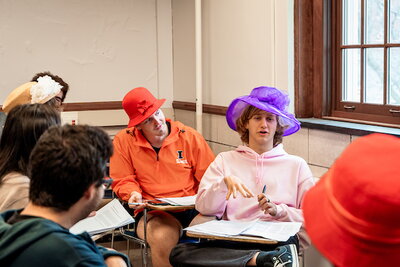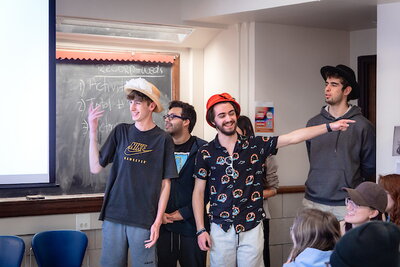
Imagine it’s 1913 and you’re in a tiny basement restaurant called Polly’s in Greenwich Village, New York. Change is in the air and intellectuals, artists, and activists gather to debate the issues of the day: women’s suffrage, labor unions, socialism, birth control, and anarchism. The nightly crowd includes figures like Emma Goldman, Margaret Sanger, Bill Heywood, W.E.B. Du Bois, and Charlotte Perkins Gilman. Those supporting suffrage and labor have formed factions and each night they attempt to convince you to support their cause.
That’s the setting students who took HIST 203: Reacting to the Past, taught by professor Leslie Reagan, found themselves in during the spring 2024 semester.
Reacting to the Past is an award-winning series of immersive role-playing games that takes students out of the lecture hall and inserts them into the past. It was developed at Barnard College and the games have been widely adopted as an innovative teaching tool. In the Department of History at the University of Illinois, Reacting to the Past has been used for at least the last 10 years and is a popular choice for completing general education requirements for students inside and outside the major.
During the the spring 2024 semester students played “Greenwich Village, 1913: Suffrage, Labor, and the New Woman.”
“Greenwich Village, 1913 is a game about setting priorities and finding solutions in the face of the new century’s many challenges,” writes the author of the course book for the game, Mary Jane Treacy. “It immerses students in the radical possibilities unlocked by the modern age. Exposed to ideas like women’s suffrage, socialism, birth control, and anarchism, students experiment with forms of political participation and bohemian self-discovery.”
During the game, Reagan acts as “game master” and encourages students to stay in character and keep the historical context in mind.
“The point is to understand different perspectives in the past and understand their perspective within their historical moment,” she explains.

She also teaches introductory lectures and leads postmortem discussions about the actual historical outcomes. Assignments include primary source readings, writing speeches, and essays.
During the game, students assume the role of a historical figure or composite character. Dressing up is encouraged, and many don elaborate hats during class. They are assigned to either the suffrage or labor factions or are bohemian villagers who must decide whose cause to support. Some characters are unaffiliated wild cards, who have secret tasks and special powers to endow others with influence and points.
Students accrue points, or pips, based on whether they achieve certain outcomes or complete certain actions, like designing suffrage posters or wearing union badges. To win, the suffrage and labor factions must convince the bohemians to support their cause. Throughout the game, they make alliances, speeches, debate, negotiate, or conspire against one another.
Connor Brewer, a sophomore mathematics major, played Max Eastman, editor of the radical magazine, The Masses. One of his assignments was to edit and compile an issue of the magazine from the submissions made by his classmates. Students submitted essays, speeches, poems, and drawings for consideration, and accrued points if he selected their submission. Brewer said he found the course a refreshing change and did a lot of research on his character and the magazine.

“This course is incredibly interactive and was very community based. This is in complete contrast to my typical STEM courses,” he said. “We don’t get to add a lot of our own personality into courses such as Applied Complex Variables or Abstract Algebra. The discussion aspect is very fulfilling, and I always enjoy showing up to class.”
Reagan prefers the intimate setting of the classes, which allows her to get to know her students better than she can in a lecture hall. She enjoys seeing students develop their critical thinking skills and confidence and learn from each other.
“Students are really proud of the work that they do in the class,” she said. “They build friendships and help each other get involved.”
In addition to HIST 203, professors and lecturers sometimes insert mini-games into other classes as well. In 2015, the Department of History led a two day conference attended by faculty across campus to teach others how to incorporate this pedagogical tool into their classes. During the second half of the semester, students also played the game “Harlem 1919: A Question of Leadership” which takes place at a fictional barbershop where men of all social stations converge to discuss the news of the day.
On the last day of the game “Greenwich Village: 1913,” victors were declared, and students took off their hats and began the debrief. Reagan went around the room asking students to introduce themselves and their characters and what they learned about them during the game.
Matthew Park, who played W.E.B. Du Bois during the game, discussed how he didn’t feel he had much support from the other characters for considering African Americans’ experiences or views on the issues of the day. As she discussed his comments with the class, Reagan remarked that, in role, Park had posted several op-eds from Du Bois and that Du Bois likely felt similarly unsupported by the village bohemians at the time.

Owen Quast, who played Margaret Sanger, said playing her taught him to fight for his views and discussed how he did research outside of class to learn more about how the eugenics movement shaped Sanger’s ideas.
“Being at Polly’s and actively constructing our vision of the world gave me an incredibly in-depth experience,” said Connor Brewer. “It’s easy to look back now and say ‘Of course! Labor conditions should be improved, and suffrage should be granted to women!’ But that ignores context; it ignores how the people of 1912 had to prioritize their efforts. Is rooting for both ideologies at the same time effective enough, or would it tear apart the foundation of a movement? … It’s a hard decision, and one of the most rewarding and accurate ways to understand this dilemma is fully immersing yourself in the time period, something this class does magnificently.”